|
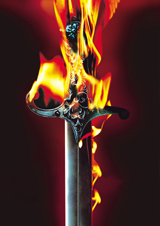 Tales of Hoffman
Tales of Hoffman
Jerzy Hoffman and Ogniem i mieczem
Andrew James Horton
This Easter, millions of Poles sat down to watch the special extended TV version of a film that has in two years become a legend in Polish film history. Jerzy Hoffman's Ogniem i mieczem (With Fire and Sword, 1999) has not simply been an epic blockbuster, but it did nearly four times better than that late 1990s yardstick of film profitability, James Cameron's Titanic, on Polish soil.
Hoffman is not content with just having reversed a decade-long trend that has favoured American films in his homeland. He is still, two years after the film's release, heavily promoting the film around the world, and CER caught up with him in London, where he had arrived for the UK premier of his blockbuster, organised by the London Polish Cultural Institute.
He had clearly come prepared for a marketing offensive of as epic proportions as his film and on a scale of organisation that you would not normally associate with the Polish film industry: a copy of Ogniem i mieczem on video, a book on the production of the film, a CD ROM of stills and the soundtrack on CD were all eagerly thrust into my hands (although I wasn't offered the Ogniem i mieczem computer game which has been developed).
Book and film
But, of course, before all Hoffman's marketing gimmicks there was the book on which Ogniem i mieczem was based. Written by Nobel laureate Henryk 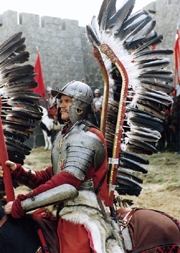 Sienkiewicz, Ogniem i mieczem was the first in a trilogy written at the end of the 19th century at a time when Poland didn't even exist on the map, partitioned as it was between Germany, the Austro-Hungary and Russia. Sienkiewicz, Ogniem i mieczem was the first in a trilogy written at the end of the 19th century at a time when Poland didn't even exist on the map, partitioned as it was between Germany, the Austro-Hungary and Russia.
The trilogy harked back to the end of the golden age of Polish history in the 17th century, when the country sprawled across the European map from the Baltic to the Black Sea and almost right up to the gates of Moscow, and Sienkiewicz wrote about this period to "uplift the hearts" of this nation that lacked a state.
The novels have never lost their attraction with Poles, and the bleak years of Communism saw no waning in the trilogy's popularity (perhaps due to anology between these two periods when Warsaw had to bow to Moscow), much to the chagrin of the authorities, who were more interested in books that illustrated contemporary social issues.
Past master
Hoffman first read Siekiewicz as a child during his time imprisoned in Siberia with his family. But Ogniem i mieczem could not be sent to him, as the Soviet authorities were exceedingly queasy about any book that even 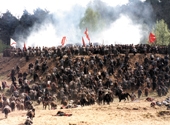 suggested that Ukrainian territory might rightly belong to Poland and the book was stopped on the borders by the censors. It was only when he returned to Poland in 1945 that he was able to read the first part of the trilogy. suggested that Ukrainian territory might rightly belong to Poland and the book was stopped on the borders by the censors. It was only when he returned to Poland in 1945 that he was able to read the first part of the trilogy.
He embarked on a career as a film-maker, studying in Moscow under Lev Kuleshov, and his early films were documentaries. But he always dreamt of adapting the trilogy. Ogniem i mieczem, the first part, was always going to be too contentious in a state which was keen to kow-tow to the Russian line on national borders, but in 1967 he got the opportunity to start making Pan Wolodyjowski (Colonel Wolodyjowski, 1969), actually the last of the three books but the least politically troublesome of the three. Not that the filming was simple, Hoffman was caught harassed by the authorities as part of the 1968 wave of organised anti-Semitism and the film's shooting had to be interrupted due to the Soviet-led invasion of Czecboslovakia.
When he came to make Potop (Deluge, 1976), the second book of the trilogy, he was able to express himself freely, but the political sensitivity of Ogniem i mieczem meant that it was certain it would never be made under Communism. Poles must have given up all hope of ever seeing the first part adapted, least of all by Hoffman, when 1989 came. Hoffman realised the implications immediately and began work on the film. It take another eleven years before the project would reach completion
A warning from history
Ogniem i mieczem, with its depiction of a territorially powerful
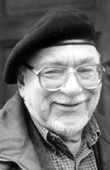 | | Hoffman in London | Polish state, use of well-loved Polish novel as a source and its sheer epic scale and box-office prowess, might make it a candidate for a "nationalist" film. Yet, Hoffman, who is a Polish Jew, denies it vigorously. He is keen to stress that Sienkiewicz was writing about a time in which Poland was at its most tolerant, with numerous ethnicities and religions living within its borders. The country was even a nascent democracy to boot, with an elected monarch and a parliament. As the director explained to CER:
The period that Sienkiewicz describes is actually the time of the end of a great country. It was the most tolerant country in Europe at the time. With King Zygmund I, the Counter-reformation came and this signalled the end of tolerance in the country. From Sienkiewicz, it is obvious that the end of tolerance caused the country's the downfall—it's partition between three powers.
So, is the film a warning to a Central Europe in which right-wing extremism is on the rise? "Yes undoubtedly," asserts Hoffman firmly "and that is how people have read the film. Especially young people, who made up four fifths of the film's audience in Poland."
However, when the film was in production, there were fears that it could damage Polish-Ukrainian relations. Many liberally minded Polish intellectuals voiced their feelings that the film should not even be attempted as its potential to offend Ukrainians was so great. President Kwaśniewski even asked to see a rough cut of the film, just before a visit to Ukraine, as he was so worried: "He was very shy about it," Hoffman laughs, "he didn't want to destroy his close relationship with Kuchma."
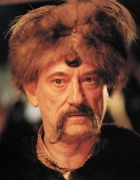 | | Bogdan Stupka | In the event, Hoffman defied expectation. The film was an enormous hit in Ukraine: Hoffman even won awards in Ukraine for his work and is now an honorary member of the Ukrainian Academy of Arts. And in a bizarre twist, Bogdan Stupka, the Ukrainian actor who plays Bohdan Chmielnicki in the film, is now Minister of Foreign Affairs in Ukraine.
With his usual swagger, Hoffman is vehement that this success was not a surprise to him. As he points out, he put everything he risked losing everything he owned in order to make this film, something he would never have done if he had not been sure of its success:
I knew what kind of film it would be and what it would discuss and there would be no better or worse and both nations would be equal, each a mirror image of the same heroism and, on the other side, same cruelty.
Hoffman is also adamant that this is an international film (and hence the effort to promote the film around the globe): Apart from the romantic side of it, the visual side of it, there is a part of the history that can be shared by all the countries, somewhere in their past. Every country has been torn apart by civil war at some point.
He makes the point that when international audiences see a Shakespearean history play, they are not usually that interested in English history per se. As further evidence he points out that when the film was shown in America, more than 40 per cent of the audience had no Polish connections and that for the Spanish market the film had a hundred dubbed prints preparped for distribution.
A masterpiece of planning
But the film's Polish success has been based on more than just the reputation of the first two films and the a resonance with the political system. Hoffman and his fellow producer Jerzy Michaluk were only too happy to reveal the secrets of their success.
Preparations for the film began immediately following the change of political climate in 1989. The first money received was grant from the Polish Ministry of Culture to turn the script into a budget. Further funds were obtained from a TV deal for a special TV  serial version of the film (originally slated to last six hour-long parts, but when the funding was downscaled it was cut back to four parts) and from sponsorship from the Okocim brewery. The team were then able to take out a bank loan for USD 5 million, the first time this method had been used to finance a Polish film since 1949. Filming didn't begin until autumn 1997. serial version of the film (originally slated to last six hour-long parts, but when the funding was downscaled it was cut back to four parts) and from sponsorship from the Okocim brewery. The team were then able to take out a bank loan for USD 5 million, the first time this method had been used to finance a Polish film since 1949. Filming didn't begin until autumn 1997.
Most of the money was tightly controlled by the bank, so the team had to find other money from here and their to fund marketing activities. They made sure that the film was mentioned in the press, both domestic and international, throughout its ten year preparation period, to build up interest.
Production costs were not to be skimped on, and they knew that if the film was to be truly successful they would have to use the most up-to-date technology and the best equipment, including computer-generated special effects. In addition, the recording of the soundtrack and the film processing, for instance, were done in the UK to maximise currency. Hoffman laughs as he recalls how this contrasts with working under the state-supported system of the previous regime: "Potop was shot with one camera and one lens," he recalls.
To ensure a successful release, they signed a deal with the Syrena Entertainment Group, the largest distribution company in Poland which handles films on behalf of all the major American production companies, ensuring that for the first six weeks of Ogniem i mieczem's run no American films 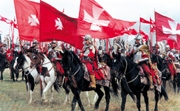 would be released. To make doubly sure the film would take off, they invited all a couple of hundred cinema heads to a conference to give them a pep talk and to impress on them that the success of this film was in their hands ("And they did everything they could," Michaluk notes with satisfaction). would be released. To make doubly sure the film would take off, they invited all a couple of hundred cinema heads to a conference to give them a pep talk and to impress on them that the success of this film was in their hands ("And they did everything they could," Michaluk notes with satisfaction).
"The bank loan was scheduled to be repaid over two years after the film's release," explained Michaluk with a triumphant grin: "it was repaid in full in just six weeks."
With the bank loan repaid, the team was free of the strict monitoring of their finances, and they were to able to splash out on the public relations and marketing offensive.
Not surprisingly for a man who has managed to raise so much money, Hoffman doesn't agree with the concept that Polish cinema's post-Communist decline is to due with a lack of cash:
Nothing is that simple, there is the manner in which people go to the cinema. We haven't got a middle class in our society: they are either very rich or very poor. The trick is to have great effect, to have millions of viewers, to provide great drama.
He also sees hope for Polish cinema in the considerable size of its domestic audience (some 38 million people), which should protect it from the severe collapse which has affected very small national cinemas, such of those of Lithuania or Georgia.
Adaptations galore
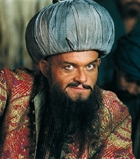 Since Ogniem i mieczem, there have been a string of Polish literary adaptations for the screen, including Andrzej Wajda's Pan Tadeusz (1999). Furthermore, there seems to be quite an appetite for Sienkiewicz, with several other films being planned based on his works. Even the Ukrainians seem to be heavily under the spell of Ogniem i mieczem, and the beleaguered Ukrainian film industry is now gearing itself up for its own historical epics which interpret the country's past. Since Ogniem i mieczem, there have been a string of Polish literary adaptations for the screen, including Andrzej Wajda's Pan Tadeusz (1999). Furthermore, there seems to be quite an appetite for Sienkiewicz, with several other films being planned based on his works. Even the Ukrainians seem to be heavily under the spell of Ogniem i mieczem, and the beleaguered Ukrainian film industry is now gearing itself up for its own historical epics which interpret the country's past.
Hoffman sees these films as playing a vital role:
In a year, 20 films are produced and five per cent of them are historical films. And we are happy that this five per cent of these films are based on Polish history. In two or three years time we will join the European Union. There are huge opportunities for unification and communication. But what will differ us will be our culture, our history and our traditions.
The director is now working on another script, and this time, with the huge
financial success of Ogniem i mieczem under their belts, the team have the rare luxury of being not having to worry about where they will find money from. Hoffman admits with remarkable cheerfulness that next year he is going to be 70 and, therefore, he can't afford to work any more on projects that take a decade to prepare.
Andrew James Horton, 23 April 2001
For more details of Polish cultural events in the UK, visit the Polish Cultural Institute website.
Moving on:
|




 Sienkiewicz, Ogniem i mieczem was the first in a trilogy written at the end of the 19th century at a time when Poland didn't even exist on the map, partitioned as it was between Germany, the Austro-Hungary and Russia.
Sienkiewicz, Ogniem i mieczem was the first in a trilogy written at the end of the 19th century at a time when Poland didn't even exist on the map, partitioned as it was between Germany, the Austro-Hungary and Russia.  suggested that Ukrainian territory might rightly belong to Poland and the book was stopped on the borders by the censors. It was only when he returned to Poland in 1945 that he was able to read the first part of the trilogy.
suggested that Ukrainian territory might rightly belong to Poland and the book was stopped on the borders by the censors. It was only when he returned to Poland in 1945 that he was able to read the first part of the trilogy.

 serial version of the film (originally slated to last six hour-long parts, but when the funding was downscaled it was cut back to four parts) and from sponsorship from the Okocim brewery. The team were then able to take out a bank loan for USD 5 million, the first time this method had been used to finance a Polish film since 1949. Filming didn't begin until autumn 1997.
serial version of the film (originally slated to last six hour-long parts, but when the funding was downscaled it was cut back to four parts) and from sponsorship from the Okocim brewery. The team were then able to take out a bank loan for USD 5 million, the first time this method had been used to finance a Polish film since 1949. Filming didn't begin until autumn 1997. would be released. To make doubly sure the film would take off, they invited all a couple of hundred cinema heads to a conference to give them a pep talk and to impress on them that the success of this film was in their hands ("And they did everything they could," Michaluk notes with satisfaction).
would be released. To make doubly sure the film would take off, they invited all a couple of hundred cinema heads to a conference to give them a pep talk and to impress on them that the success of this film was in their hands ("And they did everything they could," Michaluk notes with satisfaction). Since Ogniem i mieczem, there have been a string of Polish literary adaptations for the screen, including Andrzej Wajda's Pan Tadeusz (1999). Furthermore, there seems to be quite an appetite for Sienkiewicz, with several other films being planned based on his works. Even the Ukrainians seem to be heavily under the spell of Ogniem i mieczem, and the beleaguered Ukrainian film industry is now gearing itself up for its own historical epics which interpret the country's past.
Since Ogniem i mieczem, there have been a string of Polish literary adaptations for the screen, including Andrzej Wajda's Pan Tadeusz (1999). Furthermore, there seems to be quite an appetite for Sienkiewicz, with several other films being planned based on his works. Even the Ukrainians seem to be heavily under the spell of Ogniem i mieczem, and the beleaguered Ukrainian film industry is now gearing itself up for its own historical epics which interpret the country's past.
